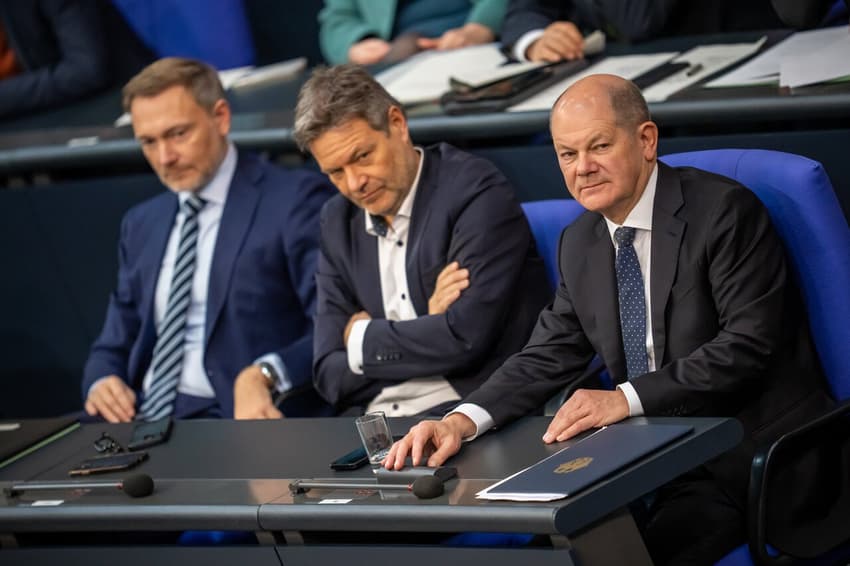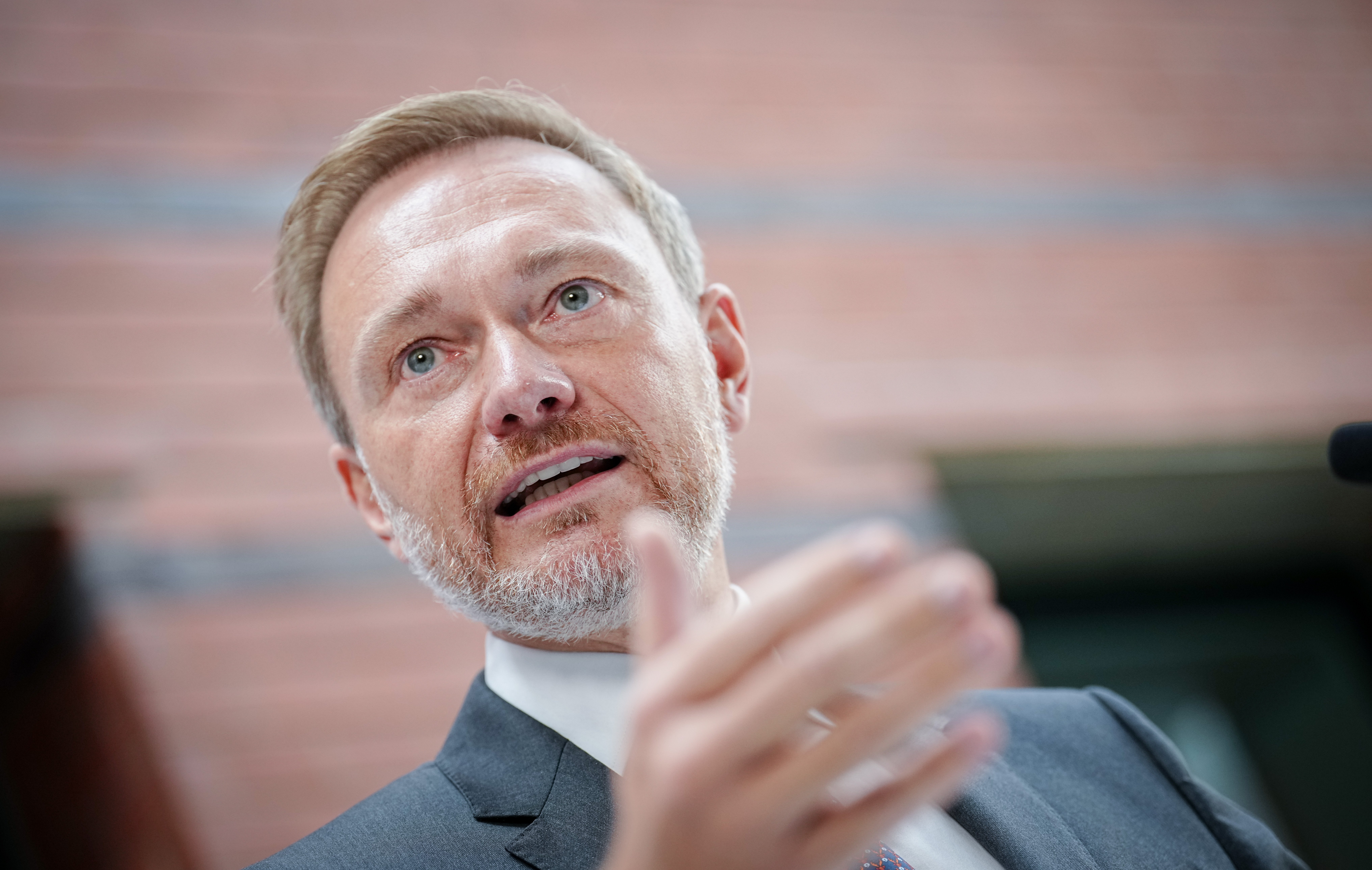Scholz defends spending as budget crisis rocks Germany

German Chancellor Olaf Scholz on Tuesday staunchly defended his government's record on spending after a bombshell court ruling on crucial debt rules sparked a budget crisis. We dig deeper into the crisis threatening a coalition collapse.
When Angela Merkel was chancellor in 2009, Germany enshrined a so-called "debt brake" in its constitution.
This caps a government's budget deficit at 0.35 percent of gross domestic product, and is emblematic of Germany's commitment to reaching balanced budgets - known as the "schwarze Null", or "black zero".
The idea of strict spending limits gained traction in the early 2000s, and politicians were really spurred into action by the 2007-2008 financial crisis, when debt and the deficit soared.
The measure can be suspended in emergencies, as long as parliament backs the move. This happened from 2020 to 2022, first to cope with the fallout from the coronavirus pandemic and then the energy crisis sparked by Russia's invasion of Ukraine.
As The Local has been reporting, the debt brake was supposed to come back into force this year - but due to the budget crisis, Finance Minister Christian Lindner announced last week the coalition was seeking to suspend it again in 2023, for the fourth year in a row.
READ ALSO: What is Germany's debt brake and how does it affect residents?
What triggered the latest crisis?
On November 15th, Germany's Constitutional Court ruled that Scholz's coalition had acted in contravention of the "debt brake".
The court was responding to a legal complaint lodged by the conservative opposition Christian Democrat (CDU) and CSU parties.
The judgement related to a 2022 decision to transfer €60 billion of unused borrowing capacity from a pot aimed at fighting the impacts of the pandemic to a "climate and transformation fund".
The immediate impact of the ruling was to wipe the €60 billion from the climate fund, which had been worth €212 billion.
As for the €60 billion - the money is gone, or more precisely, it was never there.
Rather than a pot of money, there were so-called credit authorisations in order to pay for Covid support. But because the money was not needed, the loans were not taken out.
The idea behind the coalition's budget was to use the loans for climate protection projects instead. But that is exactly what the Constitutional Court banned.
This could affect projects aimed at speeding Germany's transition to an emissions-free economy, as well as others supposed to transform industry - such as a raft of investments in semiconductor projects announced in recent times.
But the ruling is also impacting other "off budget" funds, with the government now having to account for the extra spending in its main budget.
How has the government reacted?
Projects under the climate and transformation fund were suspended, followed by a broader freeze on future spending commitments.
Lindner has been forced to seek to suspend the debt brake again, a bitter pill for a fiscal hawk whose pro-market FDP had staunchly backed the measures.
Announcing the development last week, he omitted any mention of the word "debt brake", instead referring cryptically to the introduction of a "supplementary budget", and failing to give any further explanation. It was left to the finance ministry to clarify the details afterwards.

German Finance Minister Christian Lindner. Photo: picture alliance/dpa | Kay Nietfeld
On Monday, the government agreed on taking on tens of billions more debt in 2023.
Meanwhile talks on the 2024 budget have been suspended.
In an address to parliament on Tuesday, Scholz insisted that big government outlays of recent years had been necessary to cope with the double shock of the coronavirus pandemic and energy crisis.
"In the past two years, Germany has been shaken by serious, unforeseeable external crises," he said. "That presented us with challenges that our republic has perhaps never before experienced in such concentration and severity."
He also insisted it would be a "serious, unforgivable mistake" to neglect modernising Germany, citing investments in chip and battery factories - areas where the government is providing hefty subsidies.
READ ALSO: Germany to seek debt rule suspension for 2023
What are the wider implications of this crisis on Germany and the government?
The crisis has fuelled debate on whether the debt brake should be relaxed and raised questions on whether Scholz's fragile three-party coalition might implode.
In the coming years, major German lender LBBW Bank believes massive extra outlays will be needed in areas ranging from defence to pensions and healthcare, likely amounting to about five percent of GDP.
"If Germany is to retain its economic strength and stability, it will not be possible without easing the debt brake," said the bank's chief economist Moritz Kraemer.
But while Scholz's SPD and the Greens are in favour of relaxing the rules, Lindner's FDP have seemed determined to keep the debt limit in place. At the same time, raising taxes is a red line for the FDP.
In a hint of the tussle within the coalition, Economy Minister Robert Habeck of the Greens dug in his heels on Monday, saying that "all projects that we conceived must be made possible."
Unsurprisingly, the opposition have jumped on the chaos, describing the ruling as a "political disaster". On Monday, Markus Söder, leader of the CSU party called for new federal elections.
Meanwhile, CDU leader Friedrich Merz is threatening the government with a new constitutional lawsuit if it suspends the debt brake again for the 2024 budget.
He said talks were ongoing within his party to decide if the so-called supplementary budget conformed to the constitution in their view.
Merz agreed with Söder's view that there should be new elections. “The sooner this government is replaced, the better for Germany,” said Merz.
With reporting by Sam REEVES
Comments
See Also
When Angela Merkel was chancellor in 2009, Germany enshrined a so-called "debt brake" in its constitution.
This caps a government's budget deficit at 0.35 percent of gross domestic product, and is emblematic of Germany's commitment to reaching balanced budgets - known as the "schwarze Null", or "black zero".
The idea of strict spending limits gained traction in the early 2000s, and politicians were really spurred into action by the 2007-2008 financial crisis, when debt and the deficit soared.
The measure can be suspended in emergencies, as long as parliament backs the move. This happened from 2020 to 2022, first to cope with the fallout from the coronavirus pandemic and then the energy crisis sparked by Russia's invasion of Ukraine.
As The Local has been reporting, the debt brake was supposed to come back into force this year - but due to the budget crisis, Finance Minister Christian Lindner announced last week the coalition was seeking to suspend it again in 2023, for the fourth year in a row.
READ ALSO: What is Germany's debt brake and how does it affect residents?
What triggered the latest crisis?
On November 15th, Germany's Constitutional Court ruled that Scholz's coalition had acted in contravention of the "debt brake".
The court was responding to a legal complaint lodged by the conservative opposition Christian Democrat (CDU) and CSU parties.
The judgement related to a 2022 decision to transfer €60 billion of unused borrowing capacity from a pot aimed at fighting the impacts of the pandemic to a "climate and transformation fund".
The immediate impact of the ruling was to wipe the €60 billion from the climate fund, which had been worth €212 billion.
As for the €60 billion - the money is gone, or more precisely, it was never there.
Rather than a pot of money, there were so-called credit authorisations in order to pay for Covid support. But because the money was not needed, the loans were not taken out.
The idea behind the coalition's budget was to use the loans for climate protection projects instead. But that is exactly what the Constitutional Court banned.
This could affect projects aimed at speeding Germany's transition to an emissions-free economy, as well as others supposed to transform industry - such as a raft of investments in semiconductor projects announced in recent times.
But the ruling is also impacting other "off budget" funds, with the government now having to account for the extra spending in its main budget.
How has the government reacted?
Projects under the climate and transformation fund were suspended, followed by a broader freeze on future spending commitments.
Lindner has been forced to seek to suspend the debt brake again, a bitter pill for a fiscal hawk whose pro-market FDP had staunchly backed the measures.
Announcing the development last week, he omitted any mention of the word "debt brake", instead referring cryptically to the introduction of a "supplementary budget", and failing to give any further explanation. It was left to the finance ministry to clarify the details afterwards.

On Monday, the government agreed on taking on tens of billions more debt in 2023.
Meanwhile talks on the 2024 budget have been suspended.
In an address to parliament on Tuesday, Scholz insisted that big government outlays of recent years had been necessary to cope with the double shock of the coronavirus pandemic and energy crisis.
"In the past two years, Germany has been shaken by serious, unforeseeable external crises," he said. "That presented us with challenges that our republic has perhaps never before experienced in such concentration and severity."
He also insisted it would be a "serious, unforgivable mistake" to neglect modernising Germany, citing investments in chip and battery factories - areas where the government is providing hefty subsidies.
READ ALSO: Germany to seek debt rule suspension for 2023
What are the wider implications of this crisis on Germany and the government?
The crisis has fuelled debate on whether the debt brake should be relaxed and raised questions on whether Scholz's fragile three-party coalition might implode.
In the coming years, major German lender LBBW Bank believes massive extra outlays will be needed in areas ranging from defence to pensions and healthcare, likely amounting to about five percent of GDP.
"If Germany is to retain its economic strength and stability, it will not be possible without easing the debt brake," said the bank's chief economist Moritz Kraemer.
But while Scholz's SPD and the Greens are in favour of relaxing the rules, Lindner's FDP have seemed determined to keep the debt limit in place. At the same time, raising taxes is a red line for the FDP.
In a hint of the tussle within the coalition, Economy Minister Robert Habeck of the Greens dug in his heels on Monday, saying that "all projects that we conceived must be made possible."
Unsurprisingly, the opposition have jumped on the chaos, describing the ruling as a "political disaster". On Monday, Markus Söder, leader of the CSU party called for new federal elections.
Meanwhile, CDU leader Friedrich Merz is threatening the government with a new constitutional lawsuit if it suspends the debt brake again for the 2024 budget.
He said talks were ongoing within his party to decide if the so-called supplementary budget conformed to the constitution in their view.
Merz agreed with Söder's view that there should be new elections. “The sooner this government is replaced, the better for Germany,” said Merz.
With reporting by Sam REEVES
Join the conversation in our comments section below. Share your own views and experience and if you have a question or suggestion for our journalists then email us at [email protected].
Please keep comments civil, constructive and on topic – and make sure to read our terms of use before getting involved.
Please log in here to leave a comment.